#musicember
Text
Musical December I: Singin’ in the Rain (1952) - Review
Well...this movie is perfect.

I know, I KNOW, this is the lazy answer, it would seem. But I mean it...this is an amazing film, and I genuinely can’t find any flaws with it. Like, seriously. I’m making this post as a formality, but there’s very little for me to say here. It’s an excellent musical, it’s an excellent film, it’s just excellent.
But OK, I’ll do a breakdown, I promise. It’s a good opportunity to test something out. See, given the fact that I’m covering musicals at the moment, it’s a good chance to change up the review scheme just a little bit. Here’re the changes:
Cast and Acting: Still basically the same, but singing talent and ability will now be included in the criteria for judgement.
Plot and Writing: This is in reference to the overarching plot, the use of music within the plot, and the writing during the spoken portions. Songwriting will be covered elsewhere.
Directing, Cinematography, and Choreography: Just what it looks like; we’re adding choreography to this category.
Production Design and Editing: We’re folding these together this time around. Why? Well...
The Songbook: Yeah, this has to be its own category, since we’re talking about musicals. Obviously, a proper songbook is also a part of writing and choreography, but this category is focused upon the quality of the songs in and of themselves. So, the songbook gets its own category.
And with that...

Check out Parts One and Two for the Recap!
Review
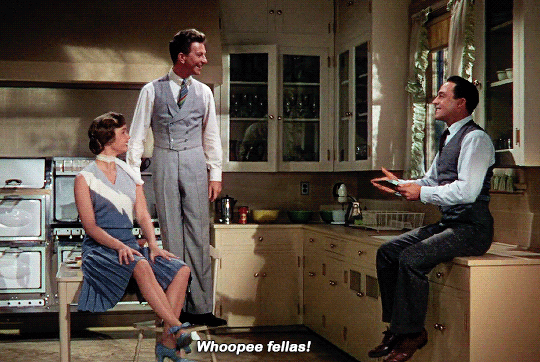
Cast and Acting: 10/10
God, I love these guys. Gene Kelly, Donald O’Connor, and Debbie Reynolds are, individually and together, some of the most enjoyable and charming protagonists I’ve ever seen in a musical. I genuinely love seeing them interact whenever on screen, and in any combination of the three characters. They’re genuinely perfect in terms of their interpersonal chemistry, and just a genuine delight.
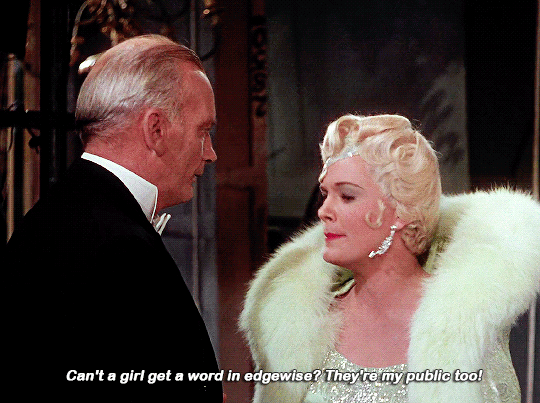
And obviously, they’re not the only notable actors in the film. Millard Mitchell shines in the latter half of the film, Cyd Charisse ekes mystique in the “Broadway Montage” sequence, and Jean Hagen...holy shit, Jean Hagen. Jean Hagen is a funny and despicable villain in this movie, and I grew to love her squeaky-ass voice (which is not her real voice, of course). She’s a horrible and petty person, but I had a lot of fun watching her. I had no problems with anyone at any point, seriously.
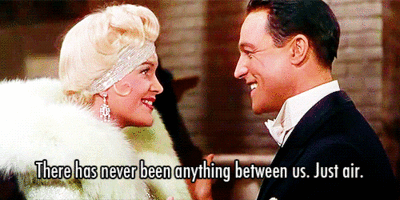
Plot and Writing: 10/10
The plot is fantastic, and well-done. But the writing! OH, THE WRITING! For a musical film, for a member of a genre with no obligation to use spoken words to get plot and story across, the writing in this movie has no business being as funny as it is! Not only do actors like O’Connor, Kelly, and Hagen say them with such perfect timing and grace, but writers Adolph Green and Betty Comden just genuinely wrote a funny-ass movie! God, some of the lines in this movie are amazing. Any interaction between Hagen and Kelly is bound to be funny in it pure acridity. And O’Connor is just constantly funny. Just...fuck, I love this movie.

Directing, Cinematography, and Choreography: 10/10
THIS MOVIE HAS NO BUSINESS LOOKING THIS GOOD. From Gene Kelly and Stanley Donen’s amazing direction and choreography, all the way to Harold Rosson and his cinematography, the look of this movie is stellar from bottom to top. And I do mean how the film is shot and composed, to be clear. Not only are there some downright gorgeous shots, but the way that the musical numbers and dances are filmed is masterful. That is, of course, on top of the already masterful dance numbers. I will gush about Kelly and O’Connor until the day I die, and about the Cocteau-esque ballet sequence far after that point. It’s stellar. And that still isn’t including the next category!

Production Design and Editing: 10/10
Y;know, I considered giving this one a 9/10, purely on Adrienne Fazan and her editing. That’s because of the Broadway sequence, because I’d roginally thought that it was too long. But honestly, real fucking talk? It’s still a beautiful and flawless sequence! It drags a little, but I wouldn’t skip it at all! And if I were showing this film to anybody for the first time, I’d laud this entire sequence! The production design is stellar throughout the movie, but this sequence is particularly spectacular on that front. So, yeah, even the thing I like the least about the film is STILL too good for me to take a point off. Production and art design are fucking flawless.
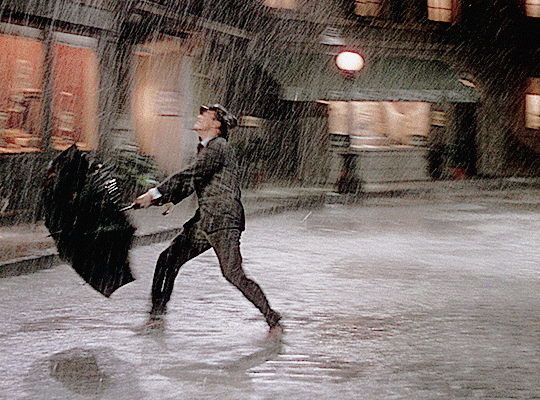
The Songbook: 10/10
...WELL? WHAT THE FUCK DO YOU WANT FROM ME, IT’S SINGIN’ IN THE RAIN, FOR CHRISSAKES
Yeah, it’s perfect! The songbook, for literally being cobbled together from older songs and movies, is executed absolutely perfectly. It’s so utterly flawless, that the songs aren’t associated with any other musical but this one! It’s a jukebox musical that broke the fucking jukebox! And during these sections, by the way, I’ll be going into my favorite song of the musical. And for this one, that’s a nearly impossible question. “Singin’ in the Rain” is obviously a timeless classic. I’m a huge sucker for “Good Mornin'” as well, and both “Fit as a Fiddle (And Ready for Love)” and “Moses Supposes” are fun as hell. But I said this was a nearly impossible question.

Holy shit, do I love this song, and this scene.
This is, without a doubt, my favorite song in the film. Not only is the song memorable and a lot of fun, but Donald O’Connor’s vocal and physical performance will never leave me. It’s genuinely one of my favorite sequences in any film, and I love it more than I could possibly express. God...God, I love this movie.

Yeah. 100%. Genuinely one of my top favorites.
Which, yeah, is crazy for the first musical of the month. How in the hell am I gonna top this? Understand, this movie is amazing. If you haven’t seen it, I highly recommend watching it at least once. I’m gonna watch it far more than that. This is one of those movies that, if it’s on, I’m watching it. It’s just unabashedly joyous and happy, and I can’t resist movies like that. Has no business being this good, but it is.
It’s moments like this that I wonder if I’m exaggerating. Maybe the emotions from the film are still lingering, and maybe time will temper my judgement. But I genuinely don’t think so. Just in case, I’ll go into the next one. Gonna be another film from the ‘50s, another film from the long list of musicals I should’ve seen by now, and another musical prominently starring a ghost singer. And finally...it’s a film that I am a little scared to watch.

Next: The King and I (1956), dir. Walter Lang
#singin' in the rain#singing in the rain#singin' in the rain 1952#film:singin' in the rain#singin in the rain#gene kelly#stanley donen#arthur freed#donald o'connor#debbie reynolds#jean hagen#millard mitchell#cyd charisse#movie musical#musical film#musical genre#musical december#musicember#user365#365days365movies#365 movie challenge#useralex#musicalsgifs#usercarol
70 notes
·
View notes
Text
Musical December I: Singin’ in the Rain (1952) - Recap: Part Two
Since this is a movie about ghost singers...
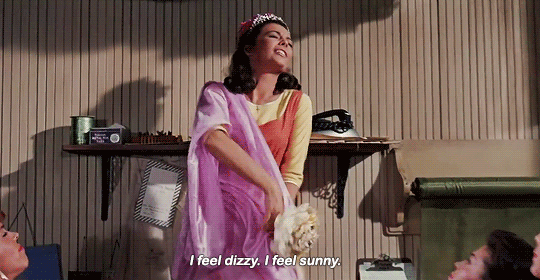
Ghost singers dub the singing voices of the stars of musical films. Essentially, if the actor or actress has a poor voice, or a voice that isn’t quite up-to-par, the ghost singer is hired to dub over their voice with their own rendition of the song. Now, there have been a lot of famous ghost singers, but you may not actually know their names. Historically, they tend to be uncredited in film. Which, yeah, is REAL SHITTY. Thankfully, however, we do know a few of them today.
Arguably one of the most famous is Marni Nixon, the ghost singer for Natalie Wood in West Side Story. Yeah, Wood’s performance wasn’t stellar, apparently, and the film producers didn’t even TELL her that she was going to be dubbed by Nixon. And as a result she recieved...no direct royalties! Instead, she got (and I am not kidding) 0.25% of Leonard Bernstein’s royalties! Fuck off! She literally had to go to court for this, and got royalties from the soundtrack.
And here’s the crazy thing: you’ve also heard her in these roles:

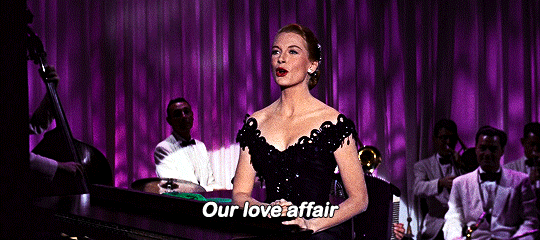
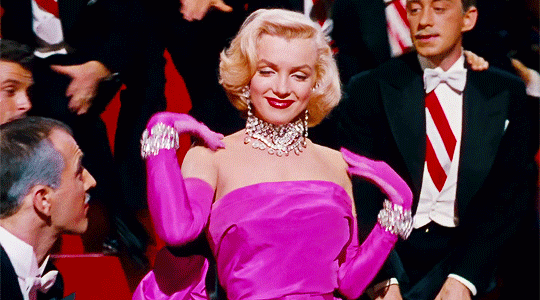

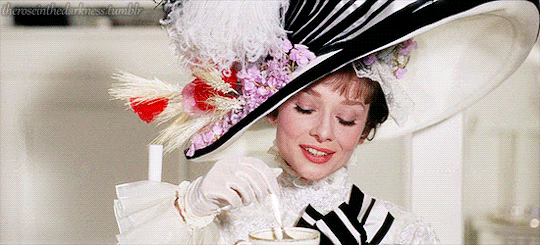

Yeah, uh...holy shit.
And while we’re at it, let’s talk about Betty Noyes. We at least know the roles that Marni Nixon took, but Betty Noyes was so prolific, we actually don’t have a confirmed list off all of her credits! Just fuckin’ suspicions! Now, granted, there are a few roles we know she did dub for. One was in Seven Brides for Seven Brothers, which I might watch this month. Another is...well, we’ll get to that one later. And the other major role?
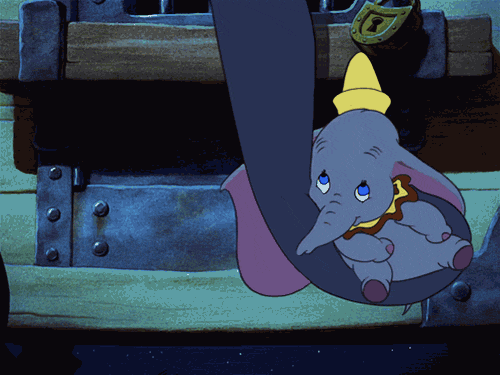
Yeah, she was Dumbo’s mom!
Noyes was actually nominated for an Oscar for that song, indirectly! Because none of the voice actors in the film were actually credited, Noyes went unknown as the voice actor for this film for far too long. And again, that’s not including the films she dubbed in that we just don’t know about! Man, Hollywood.
These two, of course, are some of many ghost singers in cinema. Betty Wand, Bill Shirley, Bill Lee, Thurl Ravenscroft, and Drew Seeley come to mind. And that last one? Oh, you’re gonna love this.

In the first High School Musical, most of Zac Efron’s lines were ghosted by Drew Seeley. This shit is still happening! Although, to be fair, Efron sung a few lines, and then sang all of his songs for the second and third films. But still, this practice is still in existence!
And so, with that said, a movie about ghost singers in genuinely an interesting choice for a musical. And that is especially because...well, we’ll get there. We’ll get there. For now, back to the show!
Check out Part One here!
Recap: Part Two
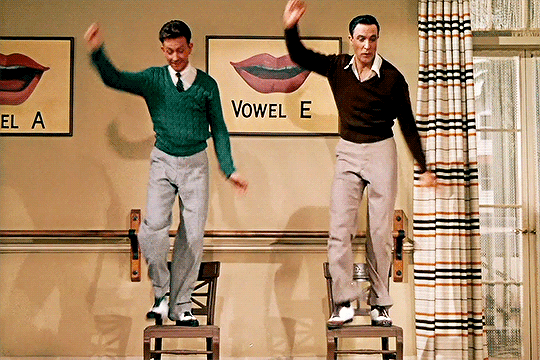
In order to prepare for being talkie stars, both Lina and Don go to diction coaches. Lina’s lessons go horribly, but Don’s literally ends in another musical number (”Moses Supposes”) with Cosmo. It’s a fun number, but they also ruin this man’s entire office. Jesus, guys, a little respect for the man’s working space.
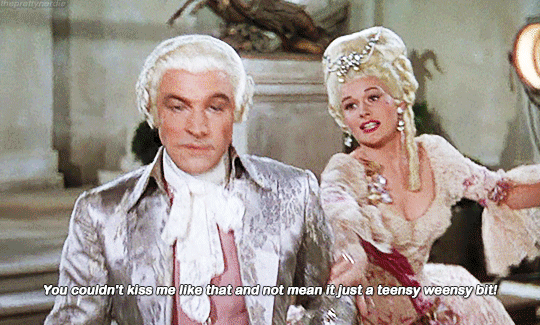
Filming begins once again, and the director, Roscoe Dexter (Douglas Fowler) has an actual mental breakdown with the difficult sound setup, and Lina’s complete idiotic inability to adapt. The film comes out, to the great nervousness of all the filmmakers. And unfortunately, Lina’s horrible voice, and the equally terrible sound recording quality makes the audience (and me) crack up with laughter. There’s a lot that happens, but it’s pretty clearly going to be a horrible movie.
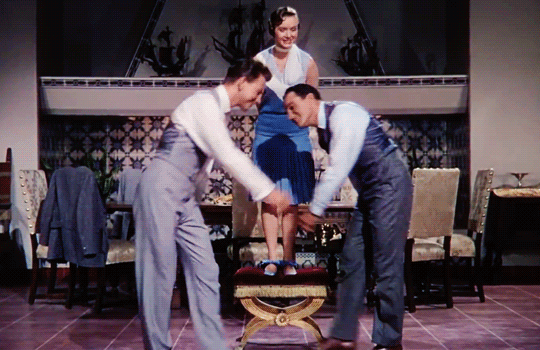
As the audience leaves, laughing and mocking the film, the stars (save Lina) realize that they’re completely fucked. In a dinner with Cosmo and Cathy, Lockwood laments his position. He also realizes that he’s not a good talkie actor, as he’s used to acting without sound. But the two friends pick him up and joke about going back into vaudeville.
But that gives Cathy an idea: why not turn the film (called The Dueling Cavalier) into a musical film! They have six weeks, making it a possibility. Excited, they talk into the morning, then sing a song about it (“Good Morning”, from Babes in Arms). And I love this song, but the entire time…all I could think about was the fact that Debbie Reynolds’ dress is the same as Quicksilver’s Silver Age costume. Seriously.
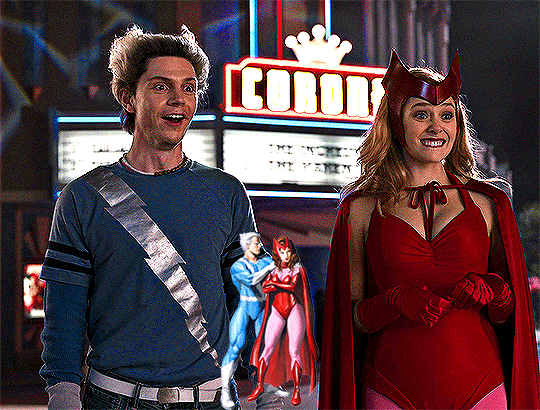
New head canon: Quicksilver is a BIG musical guy.
Anyway, after the song is concluded, the group realize that the issue with their plan is Lina’s voice. Cosmo has the brilliant idea to have Cathy dub over Lina’s voice in the final cut. Which is ironic because…well, more on that later. Anyway, it’s late. The party disbands, and Don brings Cathy home under the pouring rain. And well…you know.
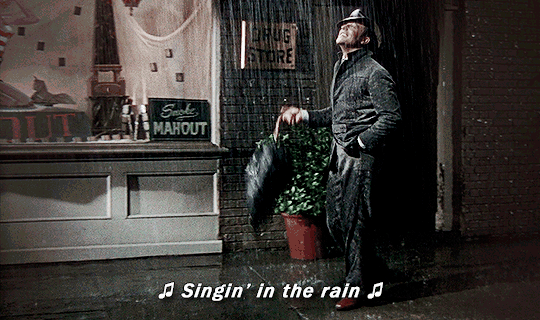
Yeah, this number (“Singin’ in the Rain”, from The Hollywood Revue of 1929), is arguably...what, did I just type “from The Hollywood Revue of 1929″? IT’S NOT AN ORIGINAL NUMBER?!? Wait, the namesake of this movie, the headliner song, the MOST FAMOUS NUMBER IN FILM HISTORY...is from a different musical? I...actually, you know what? Who cares?
Because this number is still arguably the most famous in musical cinema, as well as being beautifully done. Gene Kelly is the master of his craft, and he’s showing off in this number for sure. It’s just a happy and joyous number. And, again, if you’ve seen this movie and never done any of this dance in the rain, I feel sorry for you. You need to inject more joy into your life! Dance in a puddle, swing on a lamppost, trail and umbrella, confuse a policeman patrolling the street in the middle of the night! SOMETHING! It’s pure unadulterated joy in the form of song-and-dance, and I love it.
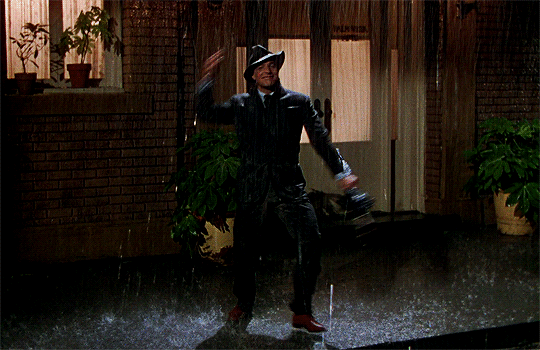
The next morning, the boys present the idea to Simpson, and he loves it. They rename the film The Dancing Cavalier, and Cosmo’s genuinely great film instincts allow the flawless reworking of the entire picture. Songs are written, Cathy gets to dubbing it, and Lena sings the original song. Horribly. And this is where the ironic part comes in.
See, the song being sung, “Would You”, features Cathy singing over Lina’s track. Thing is, though (and many of you reading probably knew this), Debbie Reynolds is NOT singing this song. Yeah, it’s actually Betty Noyes, a very famous dubbing voice actor for musicals from this time period. Meaning, yes, Betty Noyes is dubbing Debbie Reynolds, whose character is dubbing another character. Ironic.
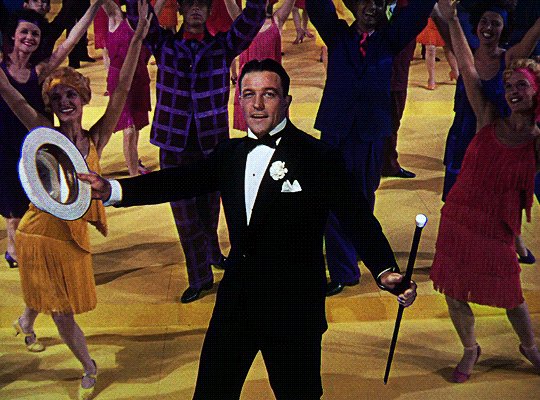
The plan goes off without a hitch, and Simpson is pleased. One more sequence is plotted out for the film. It’s a song called “Broadway Melody” (from various films), and takes place in the beginning of the hypothetical film. And it’s a ridiculously bombastic number. I love it. Holy shit, I love this movie. Seriously, there is nothing about this movie I dislike so far. This is absolutely lovely.
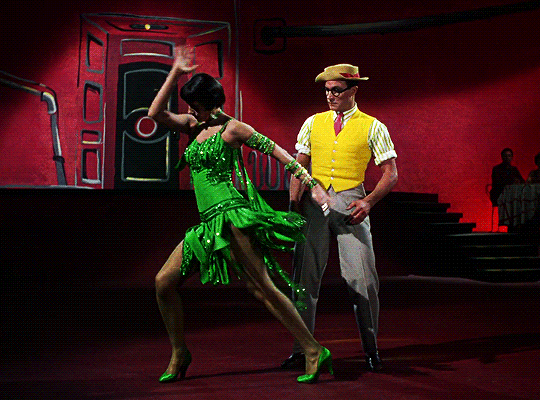
Those feelings are exemplified by this number, which serves as an interlude of sorts. It is LONG, and it concludes with a beautiful dance. The dress worn by the female dancer contains a flowing train, and off-screen fans make it seem ethereal. It’s genuinely a spectacular piece of art, and it's all about our musical’s main character falling in love with a woman (Cyd Charisse) at a casino, only to find that she’s taken. Instead, a coat and hat girl brings him his things, and he leaves the casino distraught. And this, remember, is meant to be the opening to the musical-in-a-musical. It’s a bit long and confusing…but it’s also spectacular. Like a little splash of Jean Cocteau’s Orpheus. Stellar.
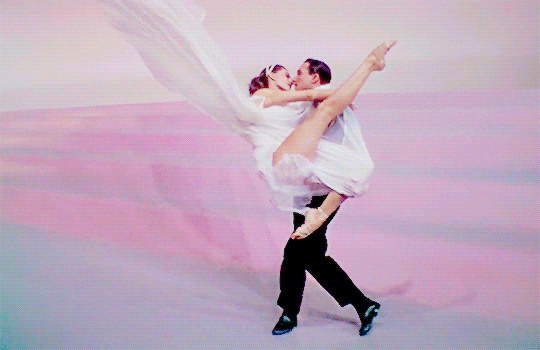
But the whole thing is quickly ruined by, who else, Lina. After finding out that Cathy’s acting as her voice, she flies into a rage, and plots to get Cathy’s name besmirched. She goes around the studio entirely, and sends out an exclusive story to every paper in town. The stories claim that she’s a big musical star, making it a massive problem for the studio to give the credit to Cathy, as planned. Due to her contract, she is in control of her publicity, not the studio. She also makes it so that Cathy’s only future job is as a dubbing artist for Lina.
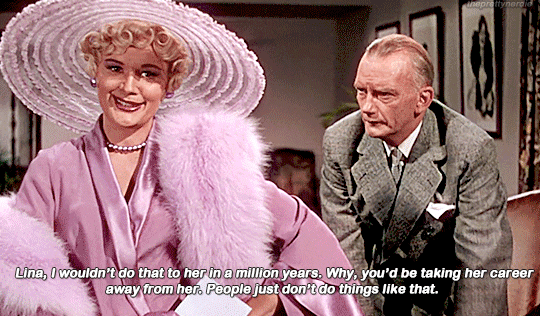
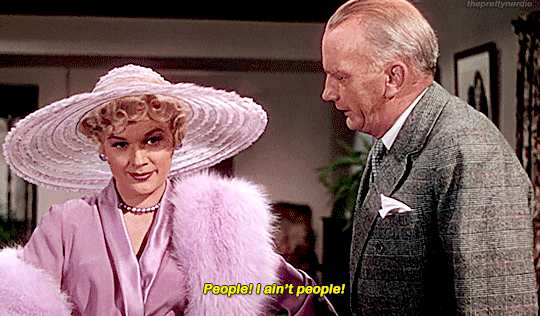
Fuck Lina, by the way; she’s a piece of shit.
The premiere happens, and the plan goes off without a hitch. The sound is fixed, the songs are great, and Cathy’s voice is beautiful. However, her credits are taken off of the film entirely, leaving her completely screwed. Because, again, fuck Lina. Said asshole gloats backstage as the crowd cheers. As the rest of them battle with the prima donna, she decides to go out and give a speech. Knowing that the situation will backfire on her, they let her do it.
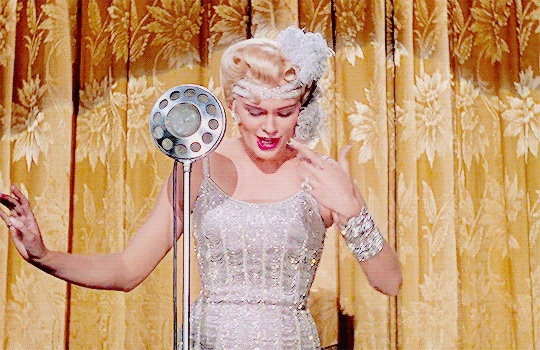
And IMMEDIATELY, upon hearing her real voice, the audience assumes that she’s doing a voice and asks her to sing for them. Seeing an opportunity, Don, Cosmo and Simpson plot as Lina panics. They tell her to go and sing, while Cathy dubs for her backstage. Don insists on it, enraging Cathy. She agrees to do it, though, and has Lina sing “Singin’ in the Rain” while she sings behind the curtains. And then…

Sweet, hilarious karma.
The gambit’s up, especially when Cosmo steps in for Cathy. Lina runs off stage as the crowd laughs uproariously, while a shocked Cathy runs off stage. Don shouts into the audience, telling them to stop her! He gives her due credit as the voice they heard singing in the film, and she looks back at him with tears in her eyes. He serenades her, and they join in a duet on stage (“You Are My Lucky Star”, from The Broadway Melody).

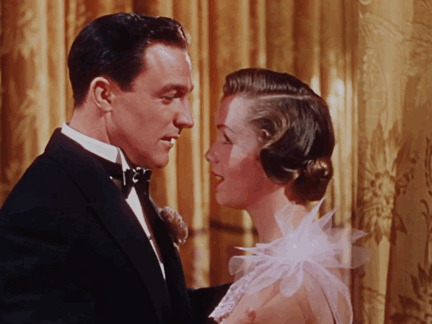
...100%. Not kidding. See you in the Review.
#singin' in the rain#singing in the rain#singin' in the rain 1952#film:singin' in the rain#singin in the rain#gene kelly#stanley donen#arthur freed#donald o'connor#debbie reynolds#jean hagen#Millard Mitchell#cyd charisse#movie musical#musical film#musical genre#musical december#musicember#user365#365days365movies#365 movie challenge#musicalsgifs#filmgifs#usergina#classicfilmsource
41 notes
·
View notes
Text
Musical December II: The King and I (1956) - Review
Talked about Anna; now let’s talk about the King.
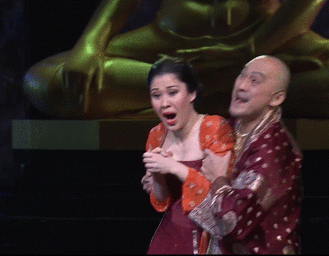
Born on October 18, 1804, Mongkut, or Phra Bat Somdet Phra Menthora Ramathibodi Sri Sinthara Mahamakut Phra Mongkut Phra Siam Deva Mahamakut Wittaya Maharaj (yes, really) was the legitimate son of a prince and princess, and became a Buddhist monk at the age of 20. Rather than immediately ascend to the role of king, he stayed a monk once his father died, and the throne went to an older half-brother of his, who was essentially voted into the position. Mongkut didn’t make any waves because he was cool like that.

When I saw Mongkut became a monk, he went all in on the monastic lifestyle. Traveled the country, strictly followed all of the monk rules, started a religious reform movement that eventually took over the religion for the entire country, yaddayaddayadda. Monk shit. After acting as a monk for 27 years (!), he was granted his rightful place on the throne after his half-brother died. And with that, his grand vision began.
See, YEARS before, Mongkut became the abbot of a Buddhist temple in Bangkok, and pledged himself in a modern education from the Western world. He studied astronomy, English and Latin, theology, the works. Mongkut really was a very educated man, and motivated to be further educated. He actually invited the preaching of Christian sermons IN A BUDDHIST TEMPLE. Dude was cool, is what I’m saying.

In fact, his coolness with the Western world is part of the reason for his succession of the throne. Mongkut beat out 72 other kids for power, and was supported by many members of the government and nobility. At 47, Mongkut becomes king of Siam. He was famous for his pro-British stance, which was notable due to Britain’s influence in the region. Siam’s neighbor, Burma, had been losing territory to the British Empire. Because, y’know, Britain be Britain. But Siam, amongst all of the kingdoms of Southeast Asia, would be the only one to stay independent.
Now king, Mongkut got busy with modernization...and also with not being a celibate monk anymore. Yeah, uh, he immediately gathered a fuckton of wives. And I mean a fuckton. In the end, Mongkut would have 32 wives and 82 children. And this was within only a 17-year reign, meaning he had a child every 3 months! Jesus, man!

Between fucking and...well, more fucking, Mongkut sought to appear as a modern Western nation. This was more political than anything else, as he’d wanted to prevent the nations of Europe from looking down on Siam, therefore preventing it from being colonized. Which, to be fair, definitely worked. This included a few ideological changes in the knowledge of Siam.
Firstly, the world was now officially round, which was squarely against Buddhist teachings. Understand how big a deal this is at the time. This is exactly the same as the evolution vs. intelligent design debate that still rages on in middle America and fundamental Christianity. Or the same as...people who believe that the Earth is flat today. FUCK, I forgot what timeline I lived in for a second, because this one is fucking ridiculous most of the time, Christ.

He continued this trend by having foreign missionaries from the USA and UK teach his family geography, astronomy, and English. He even was...relatively feminist. He released some of his concubines, ended forced marriage practices, and also ended the practice of using women as literal currency. Which, yes, was an actual thing at the time. So...kudos for that? Yeah, it’s below the very the bare minimum, but it’s at least an improvement.
But in the process, he still embraced Siamese culture through wardrobe and practices. He was still mostly faithful to his country and its beliefs, and he made that known to foreign emissaries. This culminated in the Bowring Treaty, which saw British emissaries from Hong Kong visit for economic trade reasons. See, traditionally, any member of the Siamese state would be threatened with torture for trading with foreigners. Which is, yeah, a LOT. But with an increasingly globalized world, that practice wouldn’t be sustainable for long. The Bowring treaty began trade agreements with Siam and Britain, and this began some revolutionary changes for the southeast Asian country over the next decade.
And now...enter Anna Leonowens.

Anna Leonowens came to Siam in 1862, and was hired as an instructor for the royal family. Which, again, was a super common practice at the time. Anna would end up making a lot of claims about her time there, most of which were heavily influenced or generally incorrect. For example, the Uncle Tom’s Cabin thing? Nope. Slavery was more like indentured servitude in Siam, for starters. And secondly, that practice would be ended 40 years after her visit there. So, yeah, Anna’s influence wasn’t really a part of that.
Secondly, the war elephants thing, much to my eternal regret, never happened. He never offered elephants to Lincoln to fight the Civil War. The letter was actually sent to James Buchanan, and just detailed a gift of normal elephants, for the purposes of breeding. I mean, if Jefferson can get a huge block of cheese, then Buchanan could get elephants. And it might’ve broken the ecosystem...but in an alternate universe, the USA is just a little bit crazier.

Lastly, Mongkut obviously didn’t die of a broken heart, for God sakes. Dude died of malaria after going on an expedition to watch a solar eclipse which he accurately predicted. Because Mongkut was an intelligent boss of a human being, and an absolutely brilliant man. And he wasn’t a vicious and violent barbarian trying to play at being a sophisticated Westerner. He didn’t need to be a Westerner, obviously. Dude was just a fascinating individual.
Which is probably why Thailand HATES Anna Leonowens.

To be fair, a lot of this has to do with the concept of lèse-majesté, which is the crime of saying that royalty or leadership sucks. We may shit all over America, but at least I have the ability to say Donald Trump was an absolute utter piece of shit without dealing with repercussions from the government. Freedom of speech and all that. To this day, in Thailand, any defamation against the royal family is straight-up illegal. Thailand is the only country with a constitutional monarchy to be heavily enforcing this law to this day. You can get three to fifteen years for speaking against royalty, with the most recent sentence from this year being a woman serving 43 years in prison! Christ, Thailand, what the hell!
Today, every single iteration of Anna Leonowens’ story is banned in Thailand, from the books to the play to the movies. This is, obviously, because of offense taken on behalf of Mongkut, and I don’t know if they’re wrong about that. Fact of the matter is, this franchise does represent a Eurocentric depiction of a foreign culture, and to problematic degrees as seen from a modern context.
But, uh...it’s still a great musical.

Yeah, the funny thing about problematic material is, while it deserves to be lambasted for its retrospectively negative qualities, it doesn’t mean that it doesn’t have good qualities! And maybe that’s a controversial viewpoint, but it’s how I feel. For example (and PLEASE hear me out, I beg of you), I still think Bill Cosby’s standup is genuinely funny (especially Bill Cosby: Himself), and The Cosby Show is a classic American sitcom that changed the way Black Americans were viewed, and how they viewed themselves. As a Black American, that show meant something to me and to my family. However, Bill Cosby? Still a rapist and a monster who hid behind that folksy image for decades. Yeah, he’s still absolutely a hypocritical piece of shit, but the man made good comedy, is all I’m saying. This is not an excuse for the man’s actions, just an acknowledgement of the quality of his work.
And hell, we accept a lot of problematic material in some of the greatest films ever made, because we recognize the quality of the film itself. Leon the Professional, as I discussed earlier this year, has some REALLY uncomfortable shit revolving around Natalie Portman and Jen Reno’s relationship, but it’s a good action film regardless. West Side Story is considered one of the greatest musicals ever made (and for good reason), but heavily features white actors dressing up as Hispanic characters, including the main Hispanic character. And Gone with the Wind is considered one of the greatest films ever made, despite having some of the most offensive stereotypes I’ve EVER fucking seen. Also, real talk, that movie pisses me off.
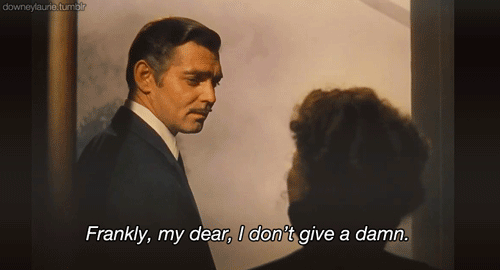
Recognize the problems, and try and see beyond them.
Yeah, this movie is historically inaccurate, technically features yellow face (yeah, uh, didn’t even talk about THAT bullshit, but Yul Brynner’s obviously not Thai), and is understandably banned in Thailand...but shit, it’s still a good movie. Perfect? Well...no. Definitely not perfect.
But let’s get into it, huh? Part One and Part Two of the Recap are right here!
Review

Cast and Acting: 8/10
Let’s talk Deborah Kerr first, because she is great as Anna Leonowens. Calm but strong, she gives the character the energy she needs, and is convincing as a caring teacher, single mother, and strong woman of the world that values herself and her beliefs. Seriously, Anna’s great, and Kerr does an excellent job playing her...during the speaking scenes. The singing belongs not to her, but to Marni Nixon, famous ghost singer and an excellent one at that. Check out my Recap of Singin’ in the Rain for more details about her and ghost singers. The supporting characters are also of note, even though I wouldn’t say they’re...great? Rita Moreno is playing Tuptim, and she’s not too bad. Same with Terry Saunders, Patrick Adiarte, and Martin Benson, who might actually be my favorite of the supporting cast. Didn’t talk about the Kralahome much, but he’s an interesting character who could’ve been used a bit more. But, uh...let’s get to the main event.
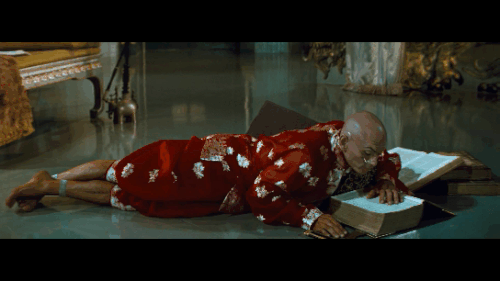
Yul Brynner is both amazing and...not amazing.
Genuinely, Brynner makes Mongkut the best character in the film, and absolutely the most entertaining when he comes on screen. And yeah, I mean that. Mongkut, inaccurate though he may be, is a fun character to watch, if not also somewhat frustrating. Which is likely the point. And Brynner tows the balance extremely well most of the time. His singing is...not great. It’s not great. And most importantly...he’s not Thai. Yeah, like I said above, I may not have mentioned it in the Recap, but it’s REALLY obvious. It was the times, I get that, and diversity in Hollywood was low, so I can somewhat forgive the movie for that. But it does get awkward, is all I’m saying. Brynner won Best Actor for this and...yeah, I didn’t get it at first, but with some time since watching the movie, I can acknowledge that he did an excellent job. So, yeah, he’s A Puzzlement, for lack of a better word.

Plot and Writing: 8/10
Honestly, this is a good story. Simple, but a good one that you don’t see too much. It should be an overwrought plot, but this film somehow makes it seem fresh? Obviously based off the semi-fictional books by Anna Leonowens and Margaret Landon, then adapted to film by Ernest Lehman, this is a well-written story and script...that’s clearly a stage musical. Yeah, uh, this is pretty obviously a Broadway musical adapted to film, in a way that Singin’ in the Rain and West Side Story aren’t. That, to be fair, may be due to the acting and direction, but the screenplay definitely doesn’t mess with the play’s script much. Or at all. And with that said...

Directing, Cinematography, and Production Design: 10/10
Oh, yeah, I changed this category then I realized that Production Design should just go here. Anyway, that point I made about the adaptation from stage to film? Yeah, Walter Lang did film this as a play, but added film flourish to it throughout. And it really works. Like, it REALLY works. Lang does a great job, as did cinematographer Leon Shamroy, because some of the shots are framed beautifully. Finally, the production design is absolutely gorgeous. It’s beautiful and well done, from costumes to sets. Absolutely no complaints, and there’s a reason this film won Oscars for Best Art Direction and Best Costume Design (for Hollywood legend Irene Sharaff)!
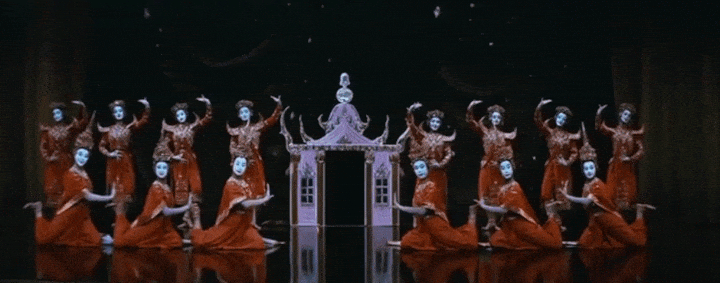
Editing: 9/10
It’s very well done and well-paced! No complaints, and few comments for this particular category. Credit to Robert Simpson, and to Carlton Falkner for sound recording (which is very well done, especially for the 1950s)!

The Songbook: 9/10
And here we are again, because this songbook is wonderful...for the most part. Where Singin’ in the Rain has a 100% iconic songbook, this one is...less so. It’s like 90% iconic. The instrumental scores are great, and the memorable songs are memorable. I’ve had “Shall We Dance” stuck in my brain for DAYS since I’ve seen this film, and “Getting to Know You”, “Whistle a Happy Tune”, and “A Puzzlement” are all very memorable parts of the score as well.
And the rest...eh? I feel like I should like both “Something Wonderful" and “Hello, Young Lovers" a lot more than I do, and while they’re good songs, I don’t remember them. Like, AT ALL. Completely wiped from my memory. And I literally forgot about “We Kiss in a Shadow” until typing this! Honestly, this might just be a me thing, but...eh?

88%, et cetera, et cetera, et cetera.
I do think this is a good movie, and I’m glad that I’ve seen it! However...it’s not in my top 5 live-action musicals. Yeah, sorry. It is good, and I’d be more than happy to watch it again, but it’s not my favorite. Who knows, though? Maybe I’ll watch it down the line and gain some new appreciation for it. I could see that happening with this one.
OK, what’s next on the list of musicals I should’ve seen by now? Let’s do another movie with Marni Nixon ghost-singing, because I can’t think of a better excuse to talk about another musical I should’ve seen by now.
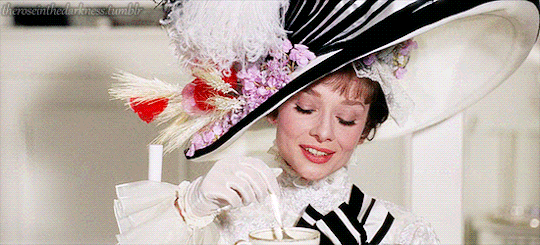
Next: My Fair Lady (1964); dir. George Cukor
#the king and i#the king and i 1952#film:the king and i#walter lang#rodgers and hammerstein#deborah kerr#yul brynner#rita moreno#martin benson#user365#365days365movies#365 movie challenge#movie musical#musical film#musical december#musicember
30 notes
·
View notes
Text
Musical December I: Singin’ in the Rain (1952) - Recap: Part One
Yeah. I don’t know how I haven’t seen this yet either.

Literally the greatest movie musical of all time, and I haven’t seen it? AFI’s got it as the best musical film ever, and the fifth best film (as of 2007, so take from that what you will). Some people think it IS the best film ever made, and definitely the best musical film ever made. As for my showtune-loving ass, I know a number of the songs BY HEART, and I haven’t actually seen this movie? I don’t even know what it’s about! Man.
But OK, what is this musical, exactly? To understand that, you have to go into, funnily enough, the film’s producer. Arthur Frees was a pianist born in South Carolina. After working the the Marx Brothers’ original vaudeville act (check out their history here if you’re interested), he was hired as lyricist by Metro-Goldwyn-Meyer Studios, AKA MGM. He eventually became an associate producer for a smaller film of theirs.

Obviously, things were going well.
His career as producer begins in earnest with another Judy Garland film, Babes in Arms, and that begin a five-film series starring the two, all produced by Freed. MGM quickly climbs to the top of Hollywood, and Freed was a part of that climb. In the process, major film stars were brought into the fray. Judy Garland, Mickey Rooney, Shirley Temple, and Zero Mostel, for starters.
But then, Freed also went to his perforing roots and brought people from the stage to perform in his productions. Singers like Frank Sinatre and Lena Horne; stage stars like Mostel, Red Skelton, and Vincente Minnelli, and famous dancers like the legendary Fred Astaire, and of course...

I swear, Gene Kelly’s dance moves are hypnotic to me.
With all these people under the fray, Freed became a Hollywood sensation. An American in Paris, Gigi, Show Boat, Easter Parade, all massive musical films, and al massive successes. Freed-produced musicals were a huge smash, and that’s mostly because he was very hands-off in the making of these musicals. He took a step back from the actual filmmaking for the most part, and quite literally Freed them of the normal trappings of movie musicals.
And it worked! An American in Paris and Gigi were both Oscar-winners for Best Picture, and Freed was the first person to be nominated and win as the producer for the film, as opposed to the studio as a whole being nominated. This was in 1951. The following year’s film wouldn’t receive any Oscars at all, but would also be a critical and commercial hit. And so...

This film, this legendary picture, is actually the child of a back catalog. With any given musical, stage or screen, you’ll form a catalog of used and unused songs. Freed wanted to use a number of his songs from previous musicals, and hired writers Betty Comden and Adolph Green to write a story that could bring the songs together. The result was one of the most famous musicals ever made, containing some of the most famous songs ever written.
And I’ll say this again, for the back room. If you’ve seen this film, and haven’t thought of the song “Singing in the Rain” while walking around in the rain AT LEAST ONCE, you are clinically dead inside. I haven’t seen this movie, and even I’ve twirled an umbrella and spun around a light post once or twice! The song itself is a symbol of joy within surrounding gloom. It carves out happiness in an environment associated with falling tears. So, goddamn it, grab and umbrella and start spinning a little, OK? It’s a classic film moment that I knew, and again, HAVE NOT SEEN THE FILM!

OK, enough. Let’s watch the actual movie!
SPOILERS AHEAD!!!
Recap: Part One

It’s 1926, and a new film is about to premiere. The fans are going fuckin' crazy as the stars of the silver screen show up to the premiere. But they all REALLY freak out when the stars of the film show up. And I’m talking Foaming Mouth Guy freaking out, to be clear. Beatlemania, women fainting, literally a dude just SCREAMING. Jesus. The stars in question are Don Lockwood (Gene Kelly) and Lena Lamont (Jean Hagen), household names and faint-inducing stars.
Rumors state that the two will be married soon, but Don insists that they’re only good friends at the moment. The newscaster prompts them to tell the story of their success from the beginning, which includes them and musician Cosmo Brown (Donald O’Connor). And from there, we launch into a flashback.
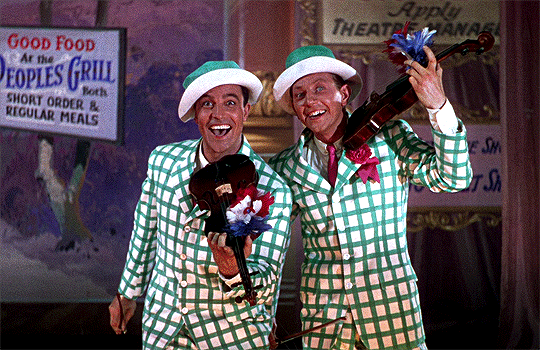
Said flashback is chock-full of lies, as we see the truth of their origins over a false narration. They began with nothing, and stayed having nothing, as the two friends became a vaudeville act during the golden age of vaudeville. And, unsurprisingly, their introductory song and dance (“Fit as a Fiddle (and Ready for Love)”) is spectacular. God, Kelly and O’Connor’s dance moves are just...hypnotic. I’m in love with it.
Unfortunately, audiences disagree, and the two have essentially no success. They try their look playing scores for silent movies, for the studio known as Monument Pictures. However, once Don subs in for a downed stuntman with his superior agility, he begins a new career as a stuntman. Which is, then and now, a severely under-appreciated job in film. So, yeah, credit where credit’s due.
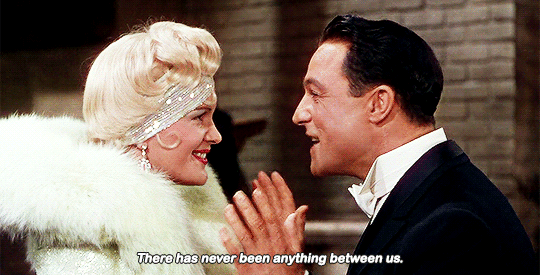
This is also where and how he met Lina Lamont, who initially gives him a complete cold shoulder. And when he finally obtains success, and Lina tries to cuddle up to him as a result, he turns her down. So, yeah, they hate each other. From there, the new film begins. This silent film is The Royal Rascal, in which Don plays a swashbuckler. After the film concludes, the two actors get on stage to thank the standing audience. However, each time Lina tries to talk, Don cuts her off. We find out exactly why when they go backstage: she’s Harley Quinn.

And I absolutely mean that; couldn’t unhear it for the entire movie. Kept thinking about that one musical number in Harlequinade in Batman: The Animated Series, where she gets on stage and sings. Honestly, I wouldn’t be surprised if this voice was the inspiration for Arleen Sorkin’s original voice for Harleen. But in terms of Lina Lamont, it’s apparently not the best voice for public speaking. Lina’s upset by this, as well as by her continually rejected advances towards Don. Although, to be fair, she doesn’t even seem to acknowledge these rejections.

Don makes his way out of the theatre, escaping from rabid fans by…Jesus, jumping onto a passing bus? Talk about a try hard, geez. He jumps off a bus into the car of an understandably startled Cathy Selden (Debbie Reynolds), who tries to sic the cops on him before realizing who he is. After that, she offers to give him a ride to Beverly Hills. On the way, she notes her opinion of film actors, which is far less than that of those on the stage. In fact, she wishes to become one of those same performers, if she can make it to New York. This offends Don, also understandably, and the two trade banter and part ways.

At the wrap-up party for the movie (”Temptation”, from Going Hollywood), head of the studio R.F. Simpson (Millard Mitchell) shows the partygoers a new film technology: synchronized video and sound. Yup. This film is about the rise of the talkie. And since this is a movie about silent film stars, I think we know how this is gonna go.
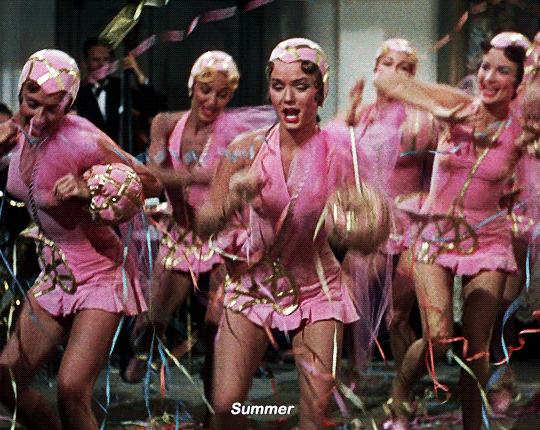
After the partygoers leave the show, they’re treated to another one, as a woman bursts from a cake. And yup, this woman is Cathy, working at the party with a troupe of dancers. They perform a song and dance (“All I Do Is Dream of You”, from Sadie McKee), and Cathy tries to take off right afterwards. But when Don tries to stop her (with insults, to be fair), she tries to retaliate with a pie to his face…which hits Lina instead. Whoops.

Seeing the score, Cathy takes off in a hurry. This results in her losing her job, which makes Don feel lousy. As, to be fair, she should. Time moves on, and a film is released that changes the entire scope of film. This is The Jazz Singer, and if you know your film history, you’ll know three things about this movie. One, it’s the first talkie, and was a game-changing revolution for the industry. Two, it was a musical, making this kind of a meta-commentary, and I can dig it! And three: blackface. Fuckin’…yeah. Different conversation for a different day.

Anyway, this change results in some changes for Don as well. But that’s preceded by a pep-talk from Cosmo, in the form of the song “Make ‘Em Laugh”. Which, to be clear, is a great song on its own, and possibly based on a song by Cole Porter called “Be a Clown”. I’d had it on my playlist long before seeing this movie. But actually seeing it with Donald O’Connor’s amazing dance and comedic choreography…holy fucking shit, it’s spectacularly funny as well. I love it. It’s absolutely a masterpiece.

Soon after, filming is set to begin on a new film, taking place during the French Revolution. In another funny scene, Don and Lina start doing their silent acting of being in love, while speaking words of pure acrimony out loud. See, out of spite and jealousy, Lina got Cathy fired from her job by talking with her boss. And while Don already hated her, it’s FAR worse now. And if that wasn’t enough, The Jazz Singer is a smash success.
This means that Mr. Simpson is turning the silent film studio over to making talkies. Cosmo is now head of the studio’s music department, so good for him! And as the men in charge discuss the change, they all come to a realization that Lina’s voice…is fucking horrible. But the film must move forward, so the studio shuts down to make the preparations.

After a spirited musical montage showing the advancement of talkies (“Beautiful Girl Montage”, from multiple sources), we find Cathy working as a dance girl for a film set. She’s spotted there both by Mr. Simpson and finally by Don, who’d been looking for her. While she assumed he hated her, he’s actually very happy to see her. And yes, she is the Inevitable Love Interest of the film. She gets hired on Don’s film, and the two finally have their own song and dance together
(“You Were Meant for Me” from The Broadway Melody). This is, of course, a love ballad, nearly culminating in a kiss.

I fucking already adore this film. Can’t wait for Part Two!
#singin' in the rain#singing in the rain#singin' in the rain 1952#film:singin' in the rain#singin in the rain#gene kelly#stanley donen#arthur freed#donald o'connor#debbie reynolds#jean hagen#millard mitchell#cyd charisse#movie musical#musical film#musical genre#musical december#musicember#user365#365days365movies#365 movie challenge#useralex#vintagegifsdaily#batwan#tuserjulian#userfilm#classicfilmsource#helenspreference#usersasha#cinematv
37 notes
·
View notes
Text
Music December III: My Fair Lady (1964) - Recap: Part One
Talking about musical theatre? Gotta go to the Greeks.

The modern Western style of theatre has its roots in ancient Greece, around the 500s or so. It’s where we get names like Aeschylus and Aristophanes and Thespis and all them guys. Performance was the preferred Greek method of telling tales, along with oration. And between the two, acting out a story automatically makes it more memorable and engaging, right?
But the stories told by the culture go back even further, told as mythology since God knows when. Over time, though, those stories were recorded into written word by poets. The Greeks had people like Homer, and their mythologies were eventually passed onto (read: basically straight-up stolen by) the Romans. They also had various famous poets, most notably Ovid. And in his 15-book epic (beat that, fanfic writers. I mean, actually beat that, I believe in you), he detailed multiple myths in Greek and Roman mythology. One of the Greek ones spoke of a sculptor named Pygmalion.

Let’s get something clear first: Pygmalion was an ass.
He was a sculptor who saw sex-workers this one time and immediately hated all women as a result. He’s basically an ancient Greek incel, who chooses to stay celibate as to not be around those gross, sinful, flawed women. Instead, he resolves to make his own perfect woman, out of pure ivory. He makes a sculpture of a beautiful woman, and immediately falls in love with it. Like an American otaku who collects way too many, uh...figurines. Like those figurines. That’s essentially Pygmalion.
And I mean it, dude falls in love with the statue. It’s Greek mythology, that kind of stuff is bound to happen. He makes it a bed, he gives it gifts, he makes out with it and caresses it. You know, normal stuff. But obviously, the statue can’t respond or react to this. So, he resigns to his objectophilia and sinks into intense depression.
And that’s when Aphrodite enters the chat.

Aphrodite is from the same island that Pygmalion was from, so she was always paying attention to the place. And when she see this weird-ass passion, she was intrigued. Pygmalion prayed that he could find a real woman like this statue, and Aphrodite granted his wish, in sort of a reverse monkey’s paw. See, instead of giving him a woman like the statue, she just brought the goddamn statue to life, and named her Galatea. They fell in love, got married, had a kid, and...that’s it. Yup.
Now, some of you might be thinking, “I’ve definitely heard this story before. And you’re probably right, but we’ll get to that in a minute. The rest of you are probably thinking, “That seems like some sexist bullshit.” And, yeah, the story of a man literally objectifying all women, and then having a loving relationship with that object...yeah, that’s pretty goddamn sexist, not gonna lie. Still hasn’t stopped it from being adapted...a LOT.
Let’s start with the obvious.

Maybe the most famous example of an inanimate human-shaped object being brought to life by love and magic is Pinocchio by Carlo Collodi. Of course, that story is very different from the story of Pygmalion, but...come on. The trope is literally the same idea. Granted, in the original book, it’s the creation that wishes to become a real boy, for the sake of its creator. It’s still extremely similar.
But fine, if you want a straight adaptation of the story, there’s no short supply. The story’s been adapted, referenced, and reinterpreted since Shakespeare. And even he referenced the story in A Winter’s Tale and Measure for Measure. Looking through a list of adaptations gives you a who’s who of authors. Shakespeare, Beddoes, Bell Scott, Tennyson (but not that one), Brodsky, Hawthorne, Updike, Lovecraft (yes, that one), Asimov, Rousseau, and Wharton. Hell, DC Comics has used the idea 3 separate times! Wonder Woman is literally a clay sculpture brought to life with love from her creator and the gods. Grant Morrison made a villainous Pygmalion in the form of Professor Pyg, and the DC Animated Universe gave the name Galatea to a clone of Supergirl!

YOU SEE WHAT I MEAN?
This is a very popular story, is what I’m saying. And we’ve all heard or seen at least one variation of it. But the funny thing is, to see the most popular straight adaptation of the original story, you have to fast-forward to 1913 and famous Irish playwright George Bernard Shaw. While he can be credited with a lot of things, including the 1925 Nobel Peace Prize in Literature and a 1938 Oscar for Best Screenplay (BOTH of which he didn’t want), one of his most famous credits is the 1913 play, Pygmalion.
This story was already popular at this point, and a lot of playwrights and poets had turned their attentions to it one way or another. Shaw’s version modernized the story (as many people did at this point), but changed the subject of Pygmalion’s focus from a sculpture into...well, a living, breathing woman named Eliza Doolittle. Eliza was a flower girl, and was Cockney. If you don’t know, Cockney describes a working class Londoner with a very distinctive dialect and use of the English language. That “working class” thing isn’t as applicable today as it was in the 1910s, for the record.
Our Pygmalion of the evening is Professor Henry Higgins, an uptight phonetics teacher who takes on the job of teaching Eliza to be a proper British lady, essentially as a bet just to show how awesome he is. So, yeah, he’s literally sculpting her into his ideal woman, and he does end up falling in love with her as a result. Also, yes, this concept will sound familiar to anyone who likes ‘90s teen comedies.
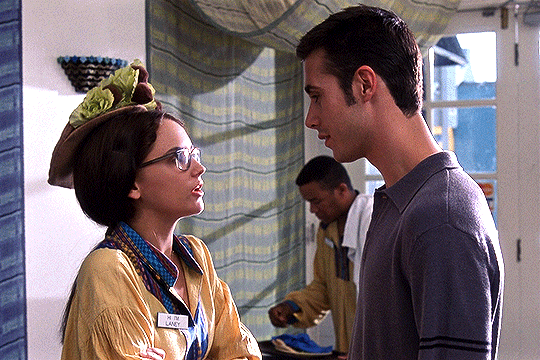
Yes, She’s All That is an adaptation of Shaw’s Pygmalion.
And no wonder, because this play is Shaw’s most popular, and it’s the version most people associate with the original myth! It was first adapted into film in 1935. In 1938, the British film Pygmalion got an Oscar for Best Screenplay. And then, in 1956, it made its way to the USA...as a musical. Because that’s what we do, what can I tell you?
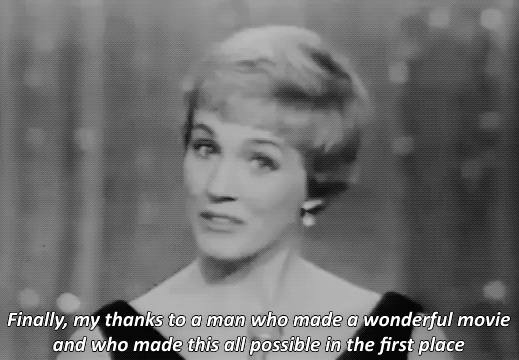
Dame Julie Andrews herself played the role of Eliza, while famous actor Rex Harrison played Higgins. And this was on stage, mind you. The play was written by Alan Lerner and Frederick Loewe, and debuted on Broadway in 1956. Unsurprisingly, the film was a smash hit, and won six Tony Awards including Best Musical. At the time, it was the longest running show on Broadway, and has had 15 runs over the years, with the last one being a USA tour in 2019! Popular play, is what I’m saying.
Sadly, Shaw wasn’t alive for any of this, as he died in 1950. Would he have liked to see his play become a smash musical? Well, he didn’t like it becoming a film, I’ll tell you that. So...maybe, maybe not. In any case, the train was running now, and the film adaptation was inevitable. It took 8 years, but Lerner’s screenplay and George Cukor‘s direction were brought onto the film adaptation of the musical adaptation of the literary adaptation of the Greek myth. For their Higgins, they chose the Broadway originator, Rex Harrison. And for Eliza? Well, of course, famous star of the silver screen...Audrey Hepburn?
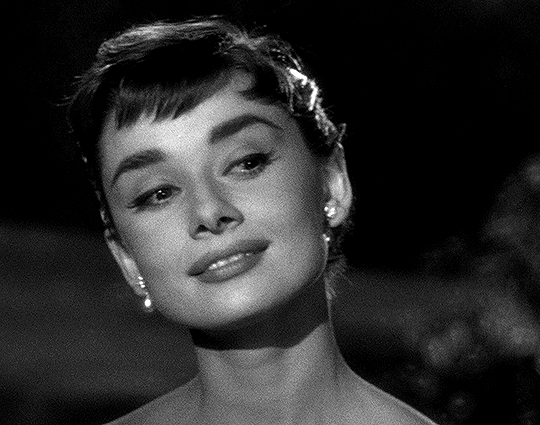
Yeah, despite not really being a Broadway actress or singer...AT ALL...the filmmakers cast Audrey Hepburn. And yeah, I know that Audrey was a ballet dancer, and she was a chorus girl in the West End for a little bit. I’m aware, but...Hepburn? Don’t get me wrong, Audrey Hepburn is fantastic, seriously. Grew up with her thanks to my Mom (she’s a huge fan), and watched her films later on in life, with this and a few more being exceptions. But she’s not really a singer, and definitely not on par with Andrews.
So why not bring in Julie Andrews. Get this: they thought she wasn’t famous enough. Which actually makes some sense, know that I’m looking at it. Sure, she was in a number of films at that point, and she was known within musical and acting circles. But she hadn’t broken out as a star as of yet. Funny thing is, ONE MONTH before My Fair Lady came out in theatres...
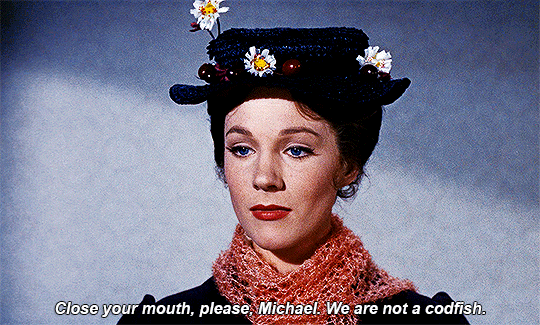
There is, within the infinite multiverse, an alternate universe in which Julie Andrews was in My Fair Lady, and Audrey Hepburn was Mary Poppins. THINK about that shit.
Anyway, despite that, My Fair Lady is, to be this day, considered one of the best movie musicals ever made. And I haven’t seen it. What’s more, even though I know the basic plot, I actually know none of the songs from this one. Sure, I’ve heard of some of them, but I don’t really know any of them like I did with Singin’ in the Rain or The King and I. So, this is exciting! New fresh musical ground for me!
And with ALL of that said, enough navel gazing! Let’s get into it!
SPOILERS AHEAD!!!
Recap: Part One
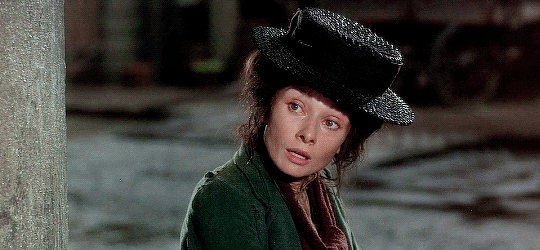
After an flowery instrumental introduction and opening credits, we find ourselves in the midst of high society as a party files out into the rain-drenched streets of London. In the chaos, gentleman Freddy Eynsford-Hill (Jeremy Brett) bumps into Cockney flower girl Eliza Doolittle (Audrey Hepburn), causing her to spill her flowers. She demands payment, and speaks in a yowling, high-pitched, Cockney accent which is...genuinely annoying, not gonna lie.
A fellow person on the streets warns her that a man is taking notes as she speaks. She obviously thinks this is a detective, and starts freaking the fuck out about it. Again, understandable; I’d freak out if somebody were taking notes about what I was saying. Turns out, though, that this man is Professor Henry Higgins (Rex Harrison), who’s writing her dialects down as a matter of record. He is, after all, a scholar of phonetics, the “science of speech”, and he proves it by Sherlock Holmesing everybody’s place of origin based on their accent. He should try that shit on me; my American accent is so undefinable, it’s near impossible to tell where I’m from.
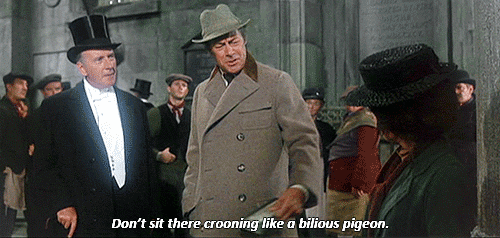
When asked to explain, he takes the opportunity to lambast Eliza’s use of the English language, as well as any other use of the language outside of his own type of usage (“Why Can’t the English Learn to Speak”). Yeah, Higgins, is SUPER elitist in terms of language usage. And while he might be verbose, he’s also an ass. Again, this is our Pygmalion of the evening. After his insult-laden song, he lays down this gem for Eliza.
Yes, you squashed cabbage leaf, you disgrace to the noble architecture of these columns, you incarnate insult to the English language, I could pass you off as the Queen of Sheba!
This speech and that insult catches the attention of Colonel Hugh Pickering (Wilfrid Hyde-White), a student of phonetics himself. Intrigued by Higgins’ idea that language is the actual division between classes (instead of, you know, unequal economic distribution), the two strike up a conversation. Turns out that Pickering is a student of the languages of India, and was coming to England to see Higgins, while Higgins was planning to go to India to see Pickering! They take off to go make out somewhere or something.

As they leave, Higgins gives money to her, mostly as a half-gesture. But it launches her and her fellows into talking about their ideal lives, and the things they’d like most (“Wouldn’t it be Loverly?”). And that song, of course, is one of the more well-known songs from this musical. It’s a cute song and dance, and then the night becomes morning. In the process, we get a fascinating shot that looks ripped right off the stage, as the people of the town filter in bit-by-bit, pausing in stages until they all move together, in a busy crowd. Honestly, I like it quite a lot.
Eliza’s father, Alfred P. Doolittle (Stanley Doolittle), a drunkard and deadbeat, comes around asking for some money, and Eliza reluctantly gives him a bit before thinking about that sick-ass insult Higgins gave. She has an idea, then uses the money to get a cab and head to Higgins’ offices. He’s playing with phonographs while talking with Pickering when Eliza is brought in by housekeeper Mrs. Pearce (Mona Washbourne).
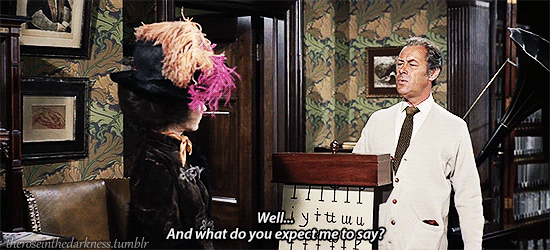
While initially incensed at her presence, Pickering offers to cover to costs of the lesson, as he’s curious to see if Higgins actually could have her pose as a Duchess. After...a lot of really annoying screaming from Eliza and condescending folderol from Higgins, the deal is set. Higgins will, over the course of the next six months, essentially train her to act and speak as a proper lady. Under some protest, she agrees...but only after he promises her a fuckton of chocolate. I get it.

Mrs. Pearce and her fellow waitstaff go upstairs to give her a bath. By force. Eliza screams. My girlfriend completely gives up on the movie, and goddamn, I kinda get it. But I’m here to stick with it, so I do. Speaking of girlfriends, Pickering plays good cop (as he has been, to his credit) and asks Higgins of his intentions with the vulnerable young woman suddenly living in his house. And that’s when Higgins launches into “I’m an Ordinary Man”, a song specifically about hating women. And yeah, dude definitely hates women, and pledges to never let a woman in his life alongside super-misogynistic references aplenty. Which, yeah, is the point of the character.

Right after that, though, we get another song from Alfred Doolittle, detailing the lifestyle of a man who cheats on his wife, constantly sleeps around, and mooches off of his daughter (“With a Little Bit of Luck”). Yup. He’s a piece of shit. Very fun song, though. In the process, he learns from another woman on the streets that Eliza no longer lives in her residence, having moved in with Higgins. And that’s the signal to go a-moochin’ for old Alfred.
At the Higgins residence, Eliza’s being worked constantly, which is why the housekeeper is worried about...Higgins overworking himself. Um. OK, whatever, she doesn’t really have an attachment to Eliza yet. Alfred then comes a-knocking, demanding...something. The two men talk around each other, but Alfred eventually just straight-up asks for money. Basically, he’s selling Eliza to Higgins for 5 bucks, thinking that she’s acting as a sex worker for Higgins.

...There are no likeable people in this film.
Well, Pickering’s likeable at least. Higgins is weirdly charmed by Alfred’s complete lack of morals and convictions, and gives him the requested money. Alfred and Eliza meet for a hot second, then Higgins goes on to tell her to practice her vowels. Pickering tries to prompt patience from Higgins, proving himself as the only likeable character so far.

Eliza’s fed up with Higgins, and fantasizes about her revenge on him, in what is...a genuinely entertaining sequence that starts to win me over (“Just You Wait"). The lessons continue, while the...ridiculously large waitstaff seems to pity...Higgins (”Servant’s Chorus”). Apparently, he’s working himself too hard, even though we literally see him starving Eliza. They’re also so very annoyed at the lessons themselves, and are on the verge of quitting. Also, Jesus, how many people does this man employ?

The lessons continue, with little success and with weird methods. There’s one scene where Higgins makes Eliza say a sentence with marbles in her mouth, and I was SO CURIOUS, I SHIT YOU NOT, that I tried it myself, using marshmallows instead of marbles. Because I don’t have marbles. But, yeah, it actually did make me more mindful for how I was enunciating. Also, I had marshmallows.
But then, one night, after many days and nights of working, and after Higgins waxes poetic about the nature of the English language...Eliza just miraculously gets it. Like...instantly and perfectly (“The Rain in Spain”). The breakthrough delights the trio so much that they begin dancing and singing all over the place. Higgins reacts by deciding to publicly “debut” her at the races the following day. Eliza reacts by...well, singing. It is a musical.

As Mrs. Pearce and the maids are trying to get her to bed, she sings...wait. “I Could’ve Danced All Night” comes from this musical? Literally, the only lines I knew from that song are literally in the title, but I’ve heard of the song. Interesting with context, gotta say. Eventually, though, Eliza goes to bed, exhausted. The next day opens with...my favorite sequence in the film.

Again clearly ripped right off the stages of Broadway, “Ascot Gavotte” is a beautiful set piece, full of ridiculous gowns and hats. And I genuinely love the entire sequence. Until the plot kicks in. Funny thing about me, I am violently allergic to what the kids once called “cringe”. It hurts me to watch shit like Eliza immediately making a fool out of herself at the races with the elite. But even then, gotta say, Eliza’s iconic gown is absolutely gorgeous. Like, look at that fucking HAT! I love it.

One of these “elite”, by the way, is Mrs. Higgins (Gladys Cooper), Henry’s mother, who is not excited to see him. She allows him, Pickering, and Eliza into her box to watch the race. She starts to talk about less-than-classy things in her new high-bred accent, and then...well, a hilarious thing happens.
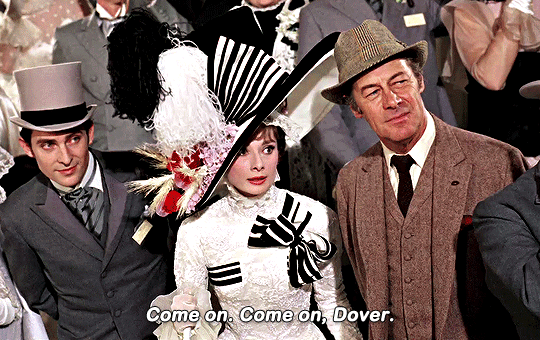

Great place to pause. See you in Part Two!
#my fair lady#film:my fair lady#my fair lady 1964#george cukor#audrey hepburn#rex harrison#stanley holloway#wilfrid hyde-white#gladys cooper#jeremy brett#movie musical#musical film#musical december#musicember#user365#365days365movies#365 movie challenge#queenmarissa#filmgifs#userbrenda#yocalio#usercandy
16 notes
·
View notes
Text
Musical December II: The King and I (1956) - Recap: Part One
This one might be a bit...problematic.

I calls it as I sees it...even when I haven’t seen it. Look, I’m always wary about American musicals from before 1980 that take place in foreign countries, and this is no exception. Especially because this one is based on a true story...that’s been heavily altered for reading and viewing audiences. And now I’m getting The Danish Girl flashbacks. Hoo boy.
So, just like I did with that film, it might be a good idea to look at the origins of this film from a historical standpoint. But first, let’s look at the origins of the musical itself, not the true story. So, to go answer that question, we’ll need to go back to Anna Leonowens and Margaret Landon.

In the 1860s, English tutor Anna Leonowens returned from the kingdom of Siam (which is now Thailand), after living there for five years. She’d been hired by the king at the time, Rama IV, or Mongkut. Afterwards, she wrote and published two books in the 1970s: The English Governess at the Siamese Court and Romance of the Harem. Both of these were stories about life in the royal palace, as told through Leonowens’ eyes.
Then, in 1944, American author Margaret Landon read these books, and combined them into a biography detailing Anna’s life in the kingdom, taking care to combine knowledge about the kingdom and its cultures as well. She called the biography Anna and the King of Siam, and it was a smash. In 1946, the film was made into its first adaptation of the same name, which starred heavy hitters like Irene Dunne and Rex Harrison in the starring roles.

Then, in 1951, Landon was approached by legendary musical makers Richard Rodgers and Oscar Hammerstein II, fresh off of their huge success, South Pacific (which I’ll get to, I promise). They asks landon for the opportunity to turn her book into a smash musical, and she sold them the rights to do so! And thus, Broadway saw the debut of the team’s fifth musical, The King and I, on March 29, 1951.
For their Anna, they had Gertrude Lawrence, and she would be followed by a veritable who’s who of successors over the years. But who would play the King himself? Well, who better to play a Thai king than Russian-American theatre actor Yul Brynner? Naturally. Also, you may know Brynner from this performance:

Or maybe, you know him from something a little more classic Hollywood.
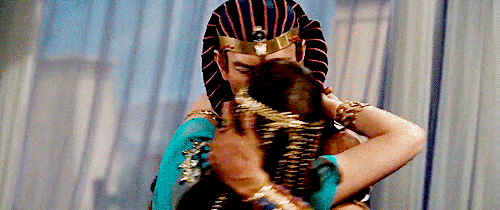
Neither of which, of course, would have been possible if Brynner hadn’t made himself known as Mongkut on stage. In fact, he was so very renowned as the character, he was given the opportunity to play him in the 1956 adaptation, alongside Deborah Kerr as Anna. And just like the musical, the film was a massive hit! And, of course, that’s what I’m watching today.
After this film was released, Anna and the King of Siam was adapted into a television series in 1972, an absolutely horrible animated film in 1999, and another film that same year. And all of that would be well and good, except for one minor problem.
Both Anna and Margaret may have...exaggerated a little.

But that’s a topic for the second part of this Recap. Let’s just get started on Part One, shall we?
SPOILERS AHEAD!!!
Recap: Part One

It’s the 1860s, and the widowed Anna Leonowens (Deborah Kerr) and her son, Louis (Rex Thompson) have arrived from the United Kingdom to the kingdom of Siam (now called Thailand), in order to serve as a schoolteacher. She is to work under the purview of the King, and has arrived in the harbor. However, the ship is greeted not by the king, but by his chief advisor, the Kralahome (Martin Benson).
Louis, in these unusual surroundings and faced by the severe-looking Kralahome, tells him how worried he is. TO calm him (and herself) down, Anna performs the same ritual that I do to calm herself down: she whistles (“I Whistle a Happy Tune”). So, whistling means that Anna’s freaking the fuck out; got it. This is interrupted when the Kralahome comes on board.
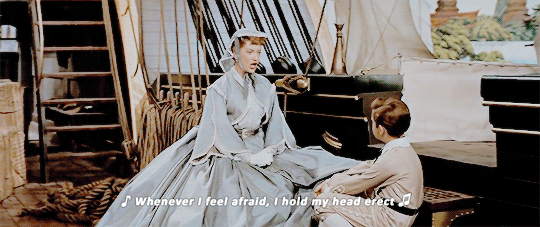
Anna is, apparently, meant to be the English tutor of the king’s children. She is also widowed, with her former husband being an officer of the British army. But where and how he died is concealed, so I can only assume that he died in a scuffle related to Thailand. A translator acts as a medium for the Kralahome, who soon reveals that he can speak English (after kicking the translator; dude’s a dick).
Seems that the King is having Anna live in the Royal Palace, rather than in her own house as promised. The Kralahome tells her to take it to the King, and she agrees. He escorts her through the city, and eventually to the palace. The city itself looks quite beautiful, if not a little stereotypical, and the palace shares that description. On the throne, having a shitty day, is the King of Siam, King Mongkut (Yul Brynner).

Mongkut is being visited by Lun Tha (Carlos Rivas), an emissary of Burma (now Myanmar), and is being presented a gift in the form of a woman, Tuptim (Rita Moreno). Which, yeah, rubs both Anna and me badly, but it’s the times and it’s the culture...I assume. After this meeting, visiting hours are concluded. That absolutely pisses Anna off, and she goes to meet him anyway.
Although initially frustrated, he listens to her...kinda. She tries to raise her issues, but he basically ignores her and asks her questions, like her age and years of marriage. She lies about the former, and says she’s 150 years old. Mongkut accepts her present and brings her to meet his multiple, MULTIPLE wives. This includes Tuptim and his head wife, Lady Thiang (Terry Saunders), who speak some English. Mongkut decides that she will teach them the ways of the “modern world” alongside his children.

But, of course, this doesn’t solve the whole “house” problem. Anna finally brings it up, but Mongkut counters that it’s an honor to live in the palace. Still, she objects, and threatens to leave. But before she does, Mongkut has her meet his children, whom she’ll teach (“The March of the Siamese Children”). And I gotta say...these are some cute kids. Devious, man, using children as weapons to get her to follow your conditions. If I were in this situation, I’d be fucked.
A bunch of these kids have some legit personality in their entrances, and I’m genuinely impressed by their characterization. One of these children is Prince Chulalongkorn (Patrick Adiarte), the son of Mongkut and Lady Thiang. And by the way, dude has a LOT of children, with 67 outside of the children seen here. Just like me, Anna’s won over, and she moves into the palace with the help of the wives.

Anna quickly makes herself known to the wives as not only a proper lady, but also as a feminist. An 1860s feminist. Talk about being ahead of the times. This, Thiang says, would make Mongkut angry, as he’s a classic meninist. While unpacking her belonging, the troubled Tuptim asks for books to read in English, while also admitting that she was taken away from her true love, Lun Tha. Anna notes that she understands how it feels to have a loved one taken from you, and follows it up with a lovely song about her late husband and young love (“Hello, Young Lovers”).
As time goes on, the lessons continue. Mongkut speaks with the Crown Prince about his lessons, including the fact that the world is round and spins on an axis, and not that it rides on the back of a turtle. Which sucks, because the turtle thing would be sick if true. Like, come on, being on top of a turtle? I would go to the location where I could pet the turtle as soon as possible. And how would that work, from a physics standpoint? I don’t fuckin’ know, I just want to be on top of a giant turtle! Some real Discworld shit there, and I can dig it.

Anyway, Mongkut agrees about the “round earth” thing, but implies that he doesn’t know that for sure. The Crown Prince is confused, as the King is supposed to know everything, not just guess at it. Mongkut says that when he becomes King, he WILL know everything. But once the Prince leaves, Mongkut has his own doubts about this. And, uh...it’s a great song (“A Puzzlement”), don’t get me wrong...but Brynner isn’t the best singer. Still, his acting sells the song.

From Mongkut’s existential crisis, we go to the lessons of the day. Thiang introduces it with the current map and knowledge of their neighbors, including Burma. They believe that SIam is massive, and that Burma is this tiny, poor, shit country with a tiny, poor, shit ruler. But Anna steps up and IMMEDIATELY clowns all over Thiang with an updated map, showing that Siam is...well, it’s pretty fuckin’ tiny.
Obviously, this doesn’t initially sit well with the Crown Prince, but she insists that England is even smaller, which it is. She also says that she’s grown to love Siam in her time there, and that leads to arguably the most famous song of the musical: “Getting to Know You”. And Anna’s dance with the kids, fuck me, is cute as shit.

However, that lesson is IMMEDIATELY derailed after the song, when Anna tries to teach the children about snow. They don’t believe the existence of snow, and that leads them to their disbelief in the size of Siam. This is interrupted by the King, who chides the children for their disobedience. During this speech, he notices the book given to Tuptim by Anna: Uncle Tom’s Cabin. UNCLE TOM’S CABIN?!? Jesus, Anna!
Looks, the Stowe-written novel is a fantastic book, and it should be read, then and now. But bringing an anti-slavery pro-abolitionist book to a country WELL-KNOWN at the time for having slaves, was a RISKY fucking move at best! This prompts a conversation about slavery, the moral responsibility of rule, and the currently occurring American Civil War. It also brings up an interesting question.
What if Lincoln fought the Civil War...with elephants?

Abe, buddy, hear me out. I love this idea. Can you imagine what the war would’ve been like if Lincoln told his cabinet members to import elephants? In that creaky voice of his, just saying, “I do not care about the expense, I want 4 score and 20 elephants here as soon as possible. We will use them to win this odious Civil War, and bring us all together under one flag once again.”
And Hamlin would’ve been like, “Elephants, Mr. President?” And while the rest of the cabinet’s thinking about it, Grant’s just fuckin’ buzzing in his chair, like “FINALLY MOTHERFUCKER GET ME ON THOSE FUCKIN’ BAD BOYS” And then, a little while later, David gets a message from the front of Gettysburg, and all it reads is “FUCKIN’ ELEPHANTS MAN!!!!” You get those photographs of the Union Army lineups, but there’s an elephant in the background! And every fucking platoon has their own elephant WHY DON’T I LIVE IN THAT UNIVERSE GODDAMMIT

Just saying. It’d be great.
Anyway, after the lesson concludes, the Kralahome shows up to tell Anna that she’s stupid, her lessons are stupid, her culture is stupid, and she’s totally gonna be a slave like the rest of them one day. Good talk, dude. That night, Anna’s summoned to speak with Mongkut, and he has a short philosophical talk with her, while asking her to write a letter to Lincoln about elephants. And again, gotta say, I’m with him on this one. He also tells her not to hold her head above his at any point, but...elephants, man.
After that, she takes off and runs into Lun Tha, there to meet Tuptim under the cover of darkness. The lovers sing a ballad together (“We Kiss in a Shadow”), and pledge to meet each other again soon. Good timing, because trouble is coming to Siam, and will distract the King from their affair.

The Kralahome brings news that an English report is going around, claiming that the King is a barbaric ruler. This danger riles him up, and he goes to confront Anna, whose command of the children singing about a house is irritating him. This, is seems, is a passive-aggressive move by Anna in regards to the promised home. The King claims he doesn’t remember this promise, and she insists that she must leave the kingdom if she has no home to live with her son. They argue, Mongkut tells Anna she is a servant, and Anna leaves in protest and distress.
That night, she’s approached by Lady Thiang, who begs her to speak with him, both about their argument, and about the rumors from England (“Something Wonderful”). The song wins her over, even though it kinda describes an abusive domestic relationship? It’s a lovely song, but it is basically saying. “Sure, he’s a dick most of the time, but he does nice things sometimes, and he needs me to love him.” Yeah, uh, yikes buddy. Problematic, but admittedly of the times.
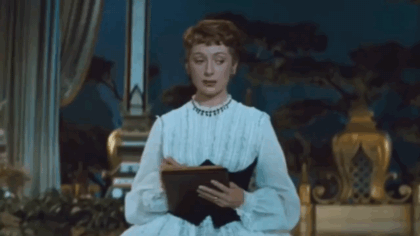
Part One over, et cetera, et cetera! See you in Part Two!
#the king and i#the king and i 1956#film:the king and i#walter lang#rodgers and hammerstein#deborah kerr#yul brynner#rita moreno#martin benson#user365#365days365movies#365 movie challenge#movie musical#musical december#musicember#Musical film
14 notes
·
View notes
Text
Musical December II: The King and I - Recap: Part Two
So, what’s the actual story of The King and I?
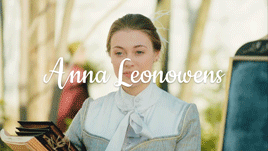
Well, first things first, let’s talk about Anna. After all, she wrote the original book, right? Anna Leonowens was born in India in 1831. This was a part of her origin that she regularly hid, claiming instead to have been born in Wales. She was also probably mixed, through her maternal grandmother. That’s unverified, though. In any case, Anna’s father was a hotel manager who died real quick, and she lived with her mother and siblings in abject poverty in India. Again, she would deny this part of her past.
Her mother remarried shortly after her birth, and her stepfather was extremely abusive towards her. This abuse may have ranged from emotional to sexual, but there are conflicting reports on that front. In any case, Anna got the fuck out of there at 14, and eventually met her future husband, Tom Leon Owen. Rather than being a British officer like she claimed (and as is said in the book and musical), he was a fairly dull man, with far less intellect than the well-read Anna. After several miscarriages, the two had two children...and no money. And then Tom died in Singapore.

Yeah, Anna’s now living with her kids in Singapore, with no money, no support, and no luck whatsoever. She also didn’t really talk to British people much, possibly because of her mixed-race status. Instead, she spent her time with American ex-pats, and that would set the stage for her post-Thailand life. She was a huge fan of abolition, and she approved of both women’s rights and the abolishment of slavery. So, yeah, accurate there.
Then, after she’d taken up a job as an English tutor, a friend of Anna’s informed her of an opportunity in Siam as a tutor. She took it, and went with her son Louis to Thailand, calling herself Ann Leonowens and reinventing her backstory entirely to get the job. She claimed she was from England (nope), was the widow of a war veteran and officer (noperino), and was three years younger. Weird choice there, but OK. And at this point, you might have noticed something.

Fitting, since the stage is now set for Anna’s visit to the court. But I’ll save that for the Review section. See, Anna’s account of Mongkut is apparently so very inaccurate, the book and all adaptations of it are and always have been banned in Thailand. Whoof. Fuckin’ whoof, man.

So, for now, let’s go back to the fictional Thailand with Part Two of this Recap! Part One is right here!
SPOILERS AHEAD!!!
Recap: Part Two

Having been moved by Thiang’s song about abusive relationships, Anna reluctantly goes to speak with Mongkut. When she shows up, he assumed she’s there to apologize, and she just fuckin’ goes with it. With very little prodding, Anna gets him to tell her about the message from England, and of his false reputation as a barbarian.
He backhandedly asks Anna for advice, asking her instead what she guesses he will do. And she tells him that she THINKS he would invite the incoming emissaries to a banquet, served in the European style. After all, the European style is...civilized...guuuuuuh. Yeah, it’s the whole “cultures that aren’t British aren’t culture” shit from this time period. Colonizing, imperialist, racism, et cetera, et cetera, et cetera. You get the idea.

Mongkut agrees to this, and sets out to prepare a banquet and performance for the visiting British ambassadors. And in return, after another backhanded set of insults towards Anna during a prayer to Buddha, he promises her and her son a house, as they’d originally agreed. And with that, the preparations are made.
One week later, the kingdom is all prepped for the visit of ambassadors Sir John Hay (Alan Mowbray) and Sir. Edward Ramsay (Geoffrey Toone). The latter is and old friend and old flame of Anna’s, and is thirsty as hell for her. That fact makes Mongkut extremely jealous immediately, but they mostly get past it as the banquet begins.

While a group of guys do Muay Thai outside, the banquet soon turns into the performance of the night, that being a Thai ballet version of Uncle Tom’s Cabin. Yes, we’re doing this. As fucking weird as this idea is, it’s also a genuinely good performance (“The Small House of Uncle Thomas”), as well as being an interesting interpretation of an American story through the eyes of a completely different culture. And then, consider that this cultural depiction is actually the depiction of Thai theatre from an American perspective, and that’s even more interesting. I’d love to see a version of this that was made by a Thai director. Odds are SUPER high that that won’t ever happen, but a dude can dream.


But Tuptim uses this to pass along her political message: FUCKING LET ME GO HOME! Yeah, she basically says that directly to him at one point, which pisses him off. What’s made worse is the fact that the story ends in the death of the slave owner, which is obviously an allegory for Mongkut himself. Yeah, Tuptim might’ve fucked up there, real talk. The performance ends, everybody but Mongkut claps, and Tuptim gets the FUCK OUT OF THERE! The entire performance was an excuse for Lun Tha to get her out of the palace. Clever, I gotta say. After the banquet, Anna goes to speak with him, and shares her appreciation for the night and for Mongkut’s efforts. He, in turn, shows his appreciation with a beautiful jeweled ring. Before they retire for the night, he tells Anna that an albino elephant has been born, and this is seen as a good omen for the future.
However, he’s still upset about the play and Tuptim. He reveals that she can’t be found, which only somewhat surprises Anna. She tells him that she was unhappy, and that she was little more to him than an object or a prize. And yeah, he doubles down on that shit. What follows is his personal philosophy, which is...I mean, dude owns a harem of women, it’s exactly what you think it is (“Song of the King”). Anna counters with the traditions of the English. And of course, this results in the other most famous song from this musical: “Shall We Dance?”.

It is a lovely song, a lovely dance, and a lovely scene.
And it’s completely destroyed by what happens next. The Kralahome bursts in, with the news that Tuptim’s been found. They drag her in, under accusation of infidelity with Lun Tha. The punishment is whipping, much to Anna’s horror. But goddammit, the king of Siam will NOT be cuckolded in his own castle! HE WILL NOT BE A BETA CUCK!

Anna stands there, resolute in her opposition, and accusing Mongkut of have no love in his heart, and of being the barbarian the English believe him to be. And with that...he leaves just before he’s about to whip her. An advisor comes in right afterwards to reveal that Lun Tha is dead, and the Kralahome tells Anna that her stupid compassion has destroyed Mongkut. She runs away in tears, planning on taking the next boat out of there.
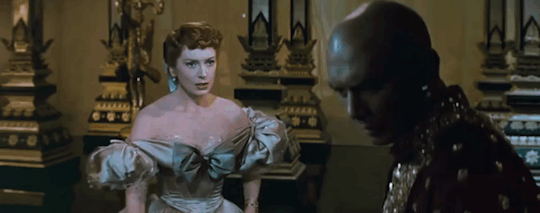
Weeks later, as her belongings are packed, and as she plans on leaving the kingdom, she reminisces on her good times there. In the process, Thiang and the Prince arrive to tell Anna that Mongkut is suddenly and unexpectedly dying. Apparently, he has a broken heart from the events of that night, and it’s so fucking bad that he’s literally dying? Fuck, I guess the doctors have just given up!
Upon hearing of Anna’s planned departure, he wrote a letter to her under great duress. She reads it and cries, upon realizing that the King really did respect her greatly. Bygones are bygones, and Anna goes to visit the ailing Mongkut. On his deathbed (and still complaining about relative head height), he gives back to her the ring she’d rejected after the whipping incident.

His numerous children are brought in to the room, and one of them begs Anna to stay in a very heartfelt plea. She agrees, for the sake of the children, and Mongkut gives her a raise. Also, damn, dude doesn’t seem like he’s dying. Just tired and kinda pissed. Still, he officially passes on his title to the Crown Prince, who makes a few proclamations. One, fireworks and boat races for New Years’. Priorities, kid, you’ve got them right. Secondly, et cetera, he ends the custom of bowing to a king.
And with that, Mongkut just...dies (“Finale”). And the movie ends.

Well...damn. See you in the Review!
#the king and i#the king and i 1952#film:the king and i#walter lang#rodgers and hammerstein#deborah kerr#yul brynner#rita moreno#martin benson#user365#365days365movies#365 movie challenge#movie musical#Musical film#musical december#musicember#mygifs#my gifs
7 notes
·
View notes
Text
December: Musicals
Time for a sing-along.

Fun fact about me: I love to sing. I was in an acapella group in graduate school (yeah, I’m one of those guys, kinda), I sing in the shower and when I’m alone, and I’m just a lover of music. To be specific, though, I LOVE me some showtunes and musical songs. This is what happens when your childhood film diet is basically all Disney Golden Renaissance and Sing-Along Song VHS tapes. Again, I’m one of those. ‘Course, that brings up a few questions. Let’s answer them in GIF form, shall we?
Favorite movie musical:

Favorite Disney musical (not favorite Disney movie):

Favorite stage musical:

First live-action movie musical:

First stage musical:

Last musical I watched:

Musical I think is objectively the most perfect:
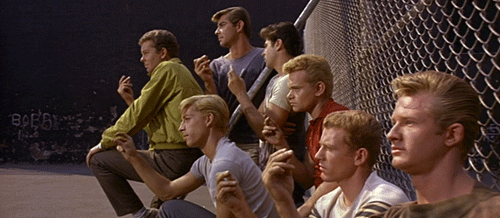
Mental rent-free living space currently reserved for:
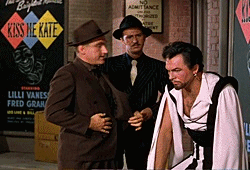
Been a little while since I’d heard it, but I will never get Brush Up Your Shakespeare out of my mind, and I refuse to purge it from my mind castle! And for the record, my favorites constantly fluctuate, as does the song running through my head at any given moment. Like, honestly, as I type this, Impossible from Rodgers and Hammerstein’s Cinderella is running rampant through my mind.
And normally, I would breakdown the genre of the month in a long and detailed essay, but...Well, first of all, this is Tumblr. Odds are that most of you are in the same situation as I am right now. I’ve been on this website (or hellsite, take your pick) long enough to know that 50% of you are thinking Hamilton, and the other 50% are thinking about one of 1000 other musicals. Probably Phantom of the Opera, but I don’t know your lives!

That said, there are some criteria to uphold to.
For this month, I’m only watching movie musicals. That means musicals that are made specifically for the medium of film. Now, they can be adaptations of stage musicals, obviously, but they cannot be filmed stage musicals. So, both Hamilton and SpongeBob SquarePants: The Broadway Musical are off the table, for starters.
Secondly, these are films that tell their stories through song! That means that the plot is advanced through the medium of vocalized music, rather than through a non-diegetic score or just through speech. The characters of the film will be singing, or the singing artist will be seen on screen at some point. Which means that, under these parameters, Disney’s Brother Bear and Tarzan doesn’t count.

Damn you, Phil Collins. Damn you.
Of course, the list is still RIDICULOUSLY long after this. And while I’d divide these up into genres and throw up a list...I’m actually not gonna do that this time! And the main reason is that I’m mostly gonna wing it! This is an opportunity for me to watch movies in a genre that I genuinely love. And although I’ve seen a number of these films...the ones I haven’t seen will surprise you.
And so, without further ado...the first film that I really should’ve seen by now...

Next: Singin’ in the Rain (1952);
dir. Gene Kelly and Stanley Donen
#musical december#musicember#user365#365days365movies#365 movie challenge#musical genre#musical film#movie musical#showtunes#musical movie
7 notes
·
View notes